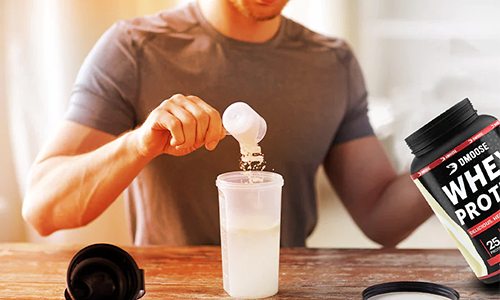Whey protein has become one of the most popular dietary supplements in the health and wellness industry, often associated with fitness enthusiasts and athletes. Its convenience, high nutritional value, and quick absorption make it a go-to option for those aiming to support muscle recovery and overall nutrition. However, many individuals who aren't engaged in regular workouts often wonder whether whey protein can still be beneficial without exercise. This growing curiosity has sparked discussions across health forums and nutrition communities, highlighting a need for clear, science-backed information. This article explores key aspects such as whey protein, why people take it, its benefits and drawbacks, and practical tips for consumption without a workout routine. Whether you're living a sedentary lifestyle or considering whey protein for general wellness, this guide will offer insights to help you make informed decisions. Keep reading to discover how whey protein may or may not align with your daily routine.
What is Whey Protein?
Whey protein is a high-quality protein that comes from milk. The liquid part separates from the curds during the cheese-making process. This clear, watery substance is then processed and turned into powder, commonly used in shakes, bars, and other supplements.
Whey protein is popular because it contains all nine essential amino acids your body needs, making it a "complete" protein. It's also easy to digest and quickly absorbed, which makes it ideal for people looking to build muscle, recover after workouts, or boost their daily protein intake.
Different types of whey protein, like whey concentrate, isolate, and hydrolysate — each with slightly different benefits depending on your goals. Whether you're an athlete, trying to manage weight, or want a nutritious boost, whey protein can be a simple and effective option.
Why People Take Whey Protein?
People take Whey Protein for many reasons, but one of the biggest is to support muscle growth. It's packed with high-quality protein that helps repair and build muscles, especially after workouts. That's why it's very popular among gym-goers, athletes, and bodybuilders.
Another common reason is convenience. Whey Protein is quick and easy to prepare—mix it with water or milk—and provides a fast nutrition source. This makes it ideal for people with busy lifestyles who may struggle to get enough protein from meals alone.
Whey Protein is also used to help with weight management. It can keep you feeling full for longer, which may reduce snacking and help control calorie intake. Some take it during weight loss plans to preserve lean muscle while shedding fat.
Lastly, many choose Whey Protein for its health benefits. It supports immune function, helps in recovery, and provides essential amino acids the body needs but can't produce independently.
Can You Take Whey Protein Without Exercising?
Yes, you can take whey protein without exercising, and many people do. Whey protein is a convenient and high-quality source of protein that supports overall health, especially if your regular diet lacks sufficient protein. It's often used to maintain muscle mass, support illness recovery, or improve daily protein intake.
However, if you're not working out, your body may not use all the extra protein for muscle growth. Instead, it may be used for other bodily functions like hormone production, immune support, and tissue repair. Taking too much without needing it could lead to excess calories and minor digestive issues.
For non-exercisers, moderation is key. If your diet already includes enough protein through food, you might not need a supplement. But whey protein can be helpful if you're skipping meals, on a special diet, or recovering from surgery or illness — just be sure it fits your overall nutritional needs.
Potential Benefits of Taking Whey Protein Without Exercising
While whey protein is often associated with muscle-building and fitness routines, it can offer several advantages even if you're not regularly hitting the gym. Here are some potential benefits of taking whey protein without exercising:
1: Supports Daily Protein Needs –
Many people struggle to meet their daily protein requirements, especially older adults or those with limited appetites. Whey protein offers a convenient and high-quality source to fill this nutritional gap.
2: Helps Maintain Muscle Mass –
Even without workouts, protein plays a key role in preserving muscle tissue. This is particularly important as we age when muscle loss naturally occurs and can lead to weakness or mobility issues.
3: Aids in Weight Management –
Whey protein is highly satiating, meaning it helps you feel full for longer. This can reduce the urge to snack or overeat, making it easier to control calorie intake and manage weight.
4: Supports Immune Health –
Whey protein contains amino acids and bioactive compounds that may support immune function. It can be particularly helpful when recovering from stress, illness, or surgery.
5: Convenient Nutritional Boost –
For people with busy lifestyles or irregular meals, whey protein shakes offer a quick, nutritious option that doesn't require cooking or preparation time.
Possible Downsides of Taking Whey Protein Without Exercising?
If you're not hitting the gym—can taking whey still benefit you? While it does offer some nutritional value, there are also a few potential downsides to consider when consuming whey protein without exercising regularly. Here are some possible drawbacks:
1: Unused Protein May Convert to Fat –
If your body doesn't need the extra protein for muscle repair or energy, it might store the excess as fat. Over time, this could lead to unwanted weight gain, especially if you're already meeting your daily protein needs through food.
2: Can Strain Your Kidneys Over Time –
High protein intake may stress your kidneys, especially if you have pre-existing conditions. While healthy individuals may not face immediate issues, long-term overconsumption without physical activity could pose risks.
3: Digestive Discomfort or Bloating –
Some people experience bloating, gas, or upset stomach after taking whey protein—especially without food or activity to help process it. This is more common in those with lactose sensitivity.
4: Imbalance in Daily Nutrients –
Relying too much on whey protein might lead to skipping other essential nutrients like fiber, vitamins, and healthy fats in whole foods. A balanced diet is always key to overall health.
5: Wasted Cost with Minimal Benefit –
If you're not using the protein to build or repair muscle, your body doesn't get much out of it. In that case, spending money on whey supplements may not be the most efficient use of your budget.
Tips to Use Whey Protein Without Working Out
Whey protein is widely known for muscle building but can benefit non-exercisers when used correctly. Here are some tips for using whey protein without working out.
1: Use it to Fill Nutritional Gaps –
Whey protein can be a convenient solution if your diet lacks enough protein from whole foods. It helps ensure your body gets the essential amino acids for basic functions like immune support and tissue repair.
2: Choose the Right Time to Take It –
You don't need to follow workout-specific timing. Instead, take whey protein as a mid-morning or afternoon snack or even with breakfast to help keep you full longer and reduce unhealthy snacking.
3: Control Your Portion Sizes –
Stick to the recommended serving size, usually 20–25 grams of protein per scoop. Overconsumption without physical activity can lead to unwanted weight gain or digestive discomfort.
4: Combine with a Balanced Diet –
Don't rely solely on whey protein for your nutrition. Pair it with a diet rich in vegetables, fruits, whole grains, and healthy fats for complete nourishment.
5: Select a Low-Calorie or Low-Carb Version –
If you're not burning extra calories through exercise, opt for a low-calorie or low-carb whey protein to avoid unnecessary calorie intake.
6: Stay Hydrated –
Protein metabolism requires water. Drinking water can help your kidneys process protein efficiently and smooth digestion.
7: Use it for Specific Health Goals –
Whey protein may support goals like managing appetite, maintaining lean body mass during weight loss, or improving skin and hair health. Know your purpose and use it accordingly.
Using whey protein smartly without exercise is all about balance and understanding your body's needs.
Relevant Questions
Can a normal person take whey protein?
Yes, a normal person can take whey protein. It's a convenient source of high-quality protein that supports general health, muscle maintenance, and recovery. However, it's best to follow the recommended dosage and consult a doctor if you have any health conditions.
Is it okay to drink whey protein on an empty stomach?
Drinking whey protein on an empty stomach is generally okay. It digests quickly and can be a good option for a morning protein boost. However, depending on individual tolerance, some people may experience mild bloating or discomfort.
When should I avoid whey protein?
You should avoid whey protein if you're lactose intolerant, allergic to dairy, or have kidney issues. It's also best to skip it if you already meet your protein needs through food. Always consult a healthcare provider if unsure.
Conclusion
In conclusion, while whey protein is most commonly associated with fitness and muscle building, it can still offer certain benefits even if you're not exercising—such as supporting daily protein intake, aiding satiety, and helping with general wellness. However, it's essential to use it mindfully, especially if you're not engaging in physical activity. So, Can I Take Whey Protein Without Exercise? Yes, but with proper awareness of your dietary needs and goals. If you're looking for high-quality whey protein options that suit active and non-active lifestyles, explore trusted selections at BoastaBite—your go-to source for premium supplements.




Leave a comment
This site is protected by hCaptcha and the hCaptcha Privacy Policy and Terms of Service apply.